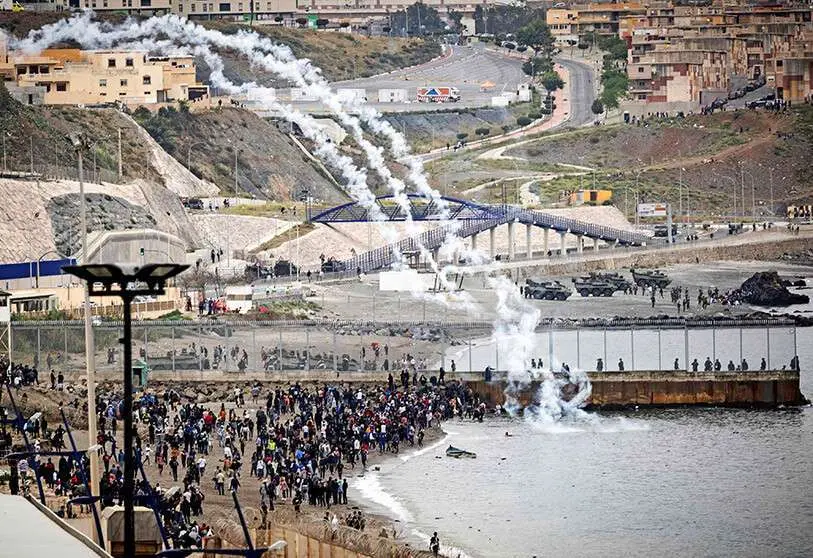Morocco's wager

Morocco has launched a wager to Spain and the European Union with the relaxation of its controls at the Ceuta border, firstly, and then at the Melilla border, which has led to an avalanche of more than 6,000 immigrants. King Mohammed VI's intention is to put pressure on Spain and the European Union with an alleged immigration conflict on Europe's southern border, which is interpreted as a risky decision to force the Spanish government to explain why the Polisario leader, Brahim Ghali, was admitted to a hospital in Logroño under a false identity at Algeria's request in order to treat his serious health problems. But the real objective of such a serious decision by Rabat, which can be compared in some respects to the 1975 green march of thousands of Moroccans in Western Sahara, is to win the backing of the Spanish government and the European Union for King Mohammed VI's solution to the Sahara conflict of a broad autonomy under Moroccan sovereignty.
Rabat is relying on the US administration's decision on December 10 last year, under President Donald Trump, which has not been reversed by President Joe Biden, to recognise Moroccan sovereignty over the Sahara and support the solution of broad autonomy. Washington's decision includes an initial investment of more than 3 billion dollars in the Sahara. Following this US decision, Arab countries such as the United Arab Emirates and Jordan, and more than 12 African countries announced their intention to open consulates in the Sahrawi cities of El Aaiun and Dakhla, which most of them have already done. Since then, Moroccan diplomacy has increased its activity to get key countries in the region, such as France and Spain, to support its thesis and encourage negotiations with Algeria in order to reach a definitive solution within the United Nations.
In December, a High-Level Meeting between Spain and Morocco was scheduled to take place in Rabat, but there was a major obstacle to its holding: King Mohammed VI's agenda did not allow for a meeting with the Spanish Prime Minister, Pedro Sánchez, a complex situation that was considered unacceptable on the Spanish side. However, the two sides went ahead with preparations for a meeting that was necessary because relevant issues were pending resolution in different sectors regarding the collaboration between the two neighbouring countries. The Trump Administration's announcement caught the Spanish government by surprise, as it had not been warned by either side, and placed it in an embarrassing situation. The decision taken was to use the coronavirus pandemic to justify postponing the summit to February, but there has been no option to reconsider a date for the summit. On April 21, the secretary general of the Polisario Front, Brahim Ghali, arrived in an ambulance at the San Pedro hospital in Logroño from the military base in Zaragoza, where he had arrived aboard a medicalised plane belonging to the Algerian Presidency. Two days later, Jeune Afrique magazine leaked the presence of the Polisario leader to be treated for COVID, in a delicate state of health due to other ailments such as colon cancer, cirrhosis of the liver and hepatitis C.
The Spanish government decided to accept Ghali for humanitarian reasons, but did not properly inform the Moroccan government, which, according to the Minister of Foreign Affairs, Arancha González Laya, is considered a privileged partner in a decision that caused division within Pedro Sánchez's government, since the Minister of the Interior, Fernando Grande-Marlaska, was not in favour of such a controversial decision as it could have serious consequences for relations with Morocco, whose anti-terrorist collaboration is absolutely essential for Spain and the European Union. The Spanish government's silence has been counterproductive for it has led to the Moroccan foreign ministry issuing two communiqués with harsh warnings and calling into question the words of Minister González Laya about good neighbourly relations and excellent relations that do not correspond to the action taken to receive the Moroccans, without the pertinent explanations, of an enemy of Morocco who, moreover, has pending cases in the Spanish National Court for complaints made by several refugees in the Tindouf camp who accuse Ghali of torture, aggression, disappearances and crimes against human rights, as well as a complaint of rape by a young woman who lives in Seville.
Spain has maintained a delicate and complicated balance in recent years in its relations with Morocco, which are strategic at all levels: economic-commercial, political, social, security and anti-terrorist, and with Algeria, which provides about half the gas consumed in Spain. The Spanish government's position on the Sahara conflict has been to defer to the efforts of the United Nations, proclaiming a neutrality that is currently considered very insufficient by Morocco in the face of its sovereignty claims, backed by the United States, and with significant gestures by the French president, Emmanuel Macron, whose La République en Marche party has opened a headquarters in the Sahrawi city of Dakhla, which is interpreted in Rabat as a foretaste of the French position of supporting the Moroccan solution. Mohamed VI's decision to launch this wager with thousands of migrants on Ceuta, many of them returned to Morocco, without opposition, is a very risky test because it calls into question respect for the Spanish border and the European Union, which will also have to take appropriate measures.

